-
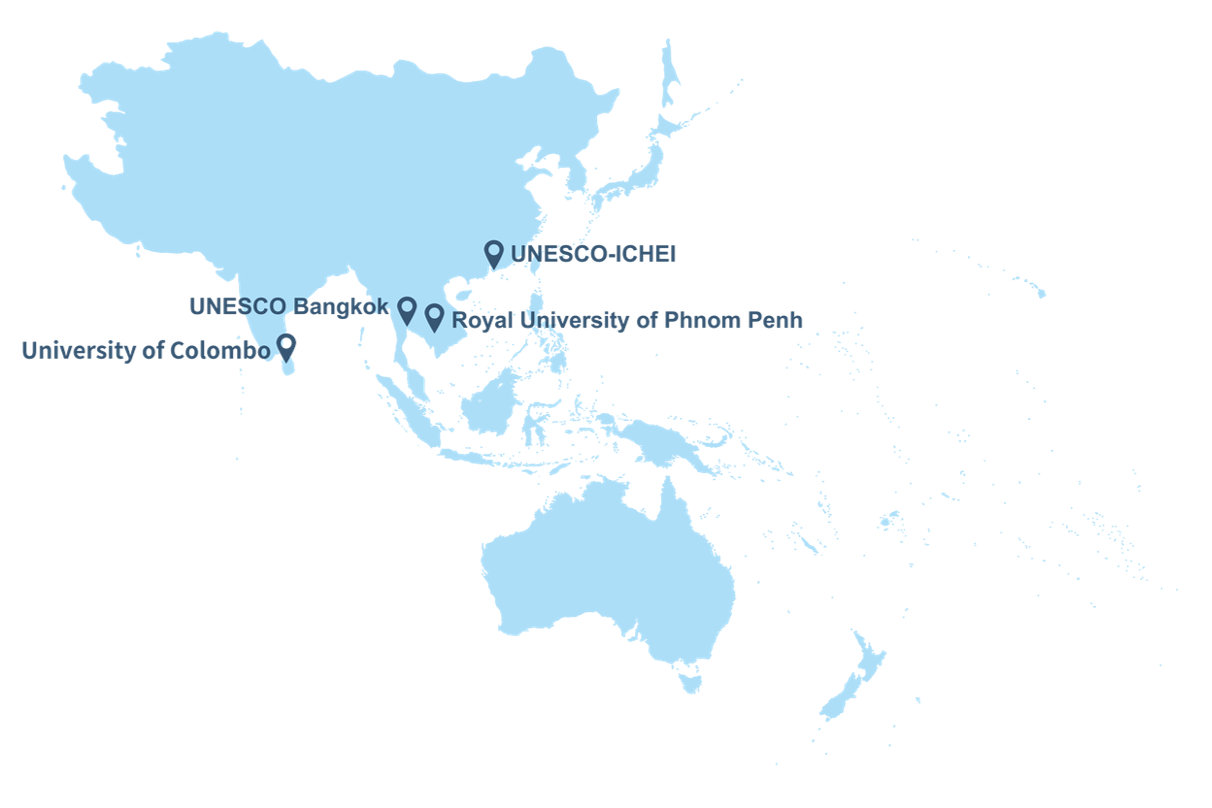 Asia
AsiaBackground
The rapid growth of digital economies in the Asia-Pacific region is posing unprecedented challenges to traditional higher education systems. In response, higher education institutions are striving to remain relevant by formulating flexible lifelong learning strategies. Against this backdrop, the effective use of technology to ensure equitable access to quality higher education across the region has become increasingly critical.
From 2016 to 2019, with generous support from the UNESCO-Shenzhen Funds-in-Trust (SFIT) and the International Centre for Higher Education Innovation under the auspices of UNESCO (UNESCO-ICHEI), the UNESCO Regional Office in Bangkok (UNESCO Bangkok) implemented a project on ICT-driven innovation in Cambodia and Sri Lanka. Two flagship universities were engaged in the pilot project: the Royal University of Phnom Penh (RUPP) in Cambodia and the University of Colombo (UoC) in Sri Lanka.
-

Objectives
The goal of the project was to increase access to quality higher education in Cambodia and Sri Lanka by leveraging ICT and strategic partnerships. The project was designed to address the challenges of equitable access to quality higher education in line with Sustainable Development Goal 4, Target 3 (SDG4.3).Objective 1Increase access to quality teaching and learning, as well as diversify learning pathways through ICT, including through blended learning and MOOCsObjective 2Strengthen higher education governance and foster partnership development to promote ICT-driven innovation
-
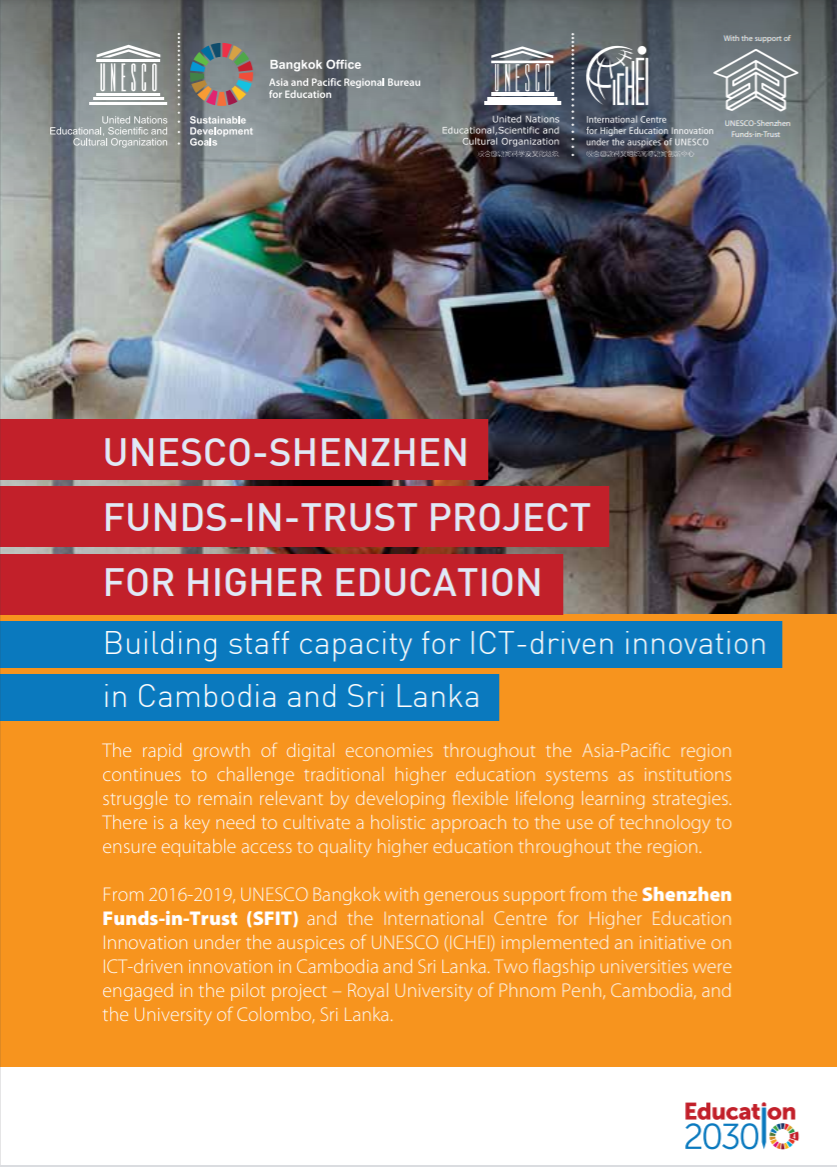
Bilingual Edition (Chinese-English) of Funds-in-Trust Project for Higher Education available on UNESCO Digital Library
UNESCO and UNESCO-ICHEI developed the Chinese version and English version of UNESCO-Shenzhen Funds-in-Trust Project for Higher Education to promote the online self-assessment tool and showcase the achievements made. Both versions were published on the UNESCO Digital Library to ensure its accessibility around the world.Over 1,500 copies of Blended Learning for Quality Higher Education, the theoretical basis of the online self-assessment tool, has been issued. The book has been reprinted three times due to large demand. UESCO-ICHEI also promoted the tool in 12 partner higher education institutions in project countries in Asia and Africa, taking the results of the project out of Asia and into the rest of the world.
-
Asia and Pacific Regional Bureau for Education, UNESCO Bangkok
Given increased demand for quality higher education and training in the region, MOOCs and blended learning are important means to ensure equitable access to quality higher education and lifelong learning opportunities for all. However, there are concerns about the gap in ICT use that may cause more serious social polarization in the future.
-
Zhou Jiagui, Deputy Secretary-General of Chinese National Commission for UNESCO
On the one hand, the Chinese government attaches great importance to ICT in education, continues to promote in-depth application of ICT technology in education, focuses on application and institutional innovation, and emphasises top-level design and multi-party coordination. On the other hand, the Chinese government has carried out fruitful educational collaboration with UNESCO in recent years, especially in the field of ICT in education. The success of the SFIT project is another remarkable outcome following the International Forum on ICT and Education 2030 in Qingdao and the International Conference on Artificial Intelligence (AI) and Education in Beijing. It has a positive and lasting influence on ICT in education and is conducive to ensuring inclusive and equitable quality education and promote lifelong learning opportunities for all. -
Xu Jianling, former Deputy Director of Shenzhen Municipal Education Bureau
As a donor of SFIT, the Shenzhen Municipal Government always pays close attention to and actively supports the development of the SFIT project. As the executor of the project, the Asia-Pacific Regional Bureau for Education, UNESCO Bangkok has guided the project and provided solid support for its smooth implementation. As the supervisor and coordinator of the SFIT project, UNESCO-ICHEI has leveraged Shenzhen's outstanding academic and industrial recourses to facilitate the planning and development of the project. -
Li Ming, Director, International Centre for Higher Education Innovation under the auspices of UNESCO (UNESCO-ICHEI), Shenzhen, China
In response to a rapidly shifting landscape of teaching and learning modalities, ICT-driven innovation has become an indispensable enabler to promote quality higher education opportunities for all. Thus, partnering with strategic stakeholders, the SFIT project leverages regional approaches to incorporate ICT applications in higher education – such as blended learning and MOOCs – for increased teacher-learner engagement, enhanced curriculum design, and improved institutional governance with the aim to strengthen global collaboration to achieve SDG4. -
Phal Des, Vice-Rector of Royal University of Phnom Penh
Royal University of Phnom Penh is very lucky to participate in the Shenzhen Funds-in-Trust project. We received support from UNESCO, Shenzhen Municipal People's Government, Southern University of Science and Technology and UNESCO-ICHEI in blended learning. We have carried out regional cooperation, drawn on international experience, and then localised such experience for our own application, turning sincere partnerships into the driving force for university innovation.
-
Chandrika Wijeyaratne , Chancellor of the University of Colombo, Sri Lanka
For the University of Colombo, the SFIT project inspired university management staff to think holistically. In the blended learning programs, our faculties carried out close cooperation in overall planning and course development. We also cooperated with the industry and international partners, which is of great importance. -
Professor Lim Cher Ping, Chair Professor of Learning Technologies and Innovation, The Education University of Hong Kong, Hong Kong SAR, China & Visiting Professor, Center of Higher Education Research, Southern University of Science and Technology (SUSTech), Shenzhen, China
The new Blended Learning Self-Assessment Tool sends a loud and clear message to higher education institutions that introducing an innovation into an institution requires a systemic change; a holistic approach towards strategic planning is crucial to enhance access to quality higher education. It is only when such an approach is adopted that the potential of blended learning for the achievement of Sustainable Development Goal 4 (SDG4) is more likely to be fulfilled.
-
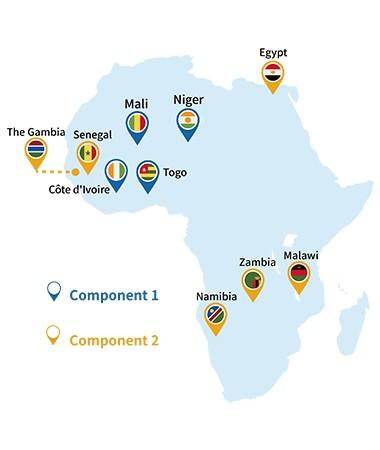 AfricaBackground
AfricaBackgroundIn recent years, massification of higher education in Africa has witnessed rapid increase in student enrolment, as well as the number and types of higher education providers. Therefore, it is necessary to set up quality assurance (QA) systems in order to ensure quality and promote mobility of higher education in Africa. Against this background, the UNESCO-Shenzhen Funds in Trust (SFIT) project in Africa was initiated to support the institutional, national and regional higher education systems by developing quality assurance mechanisms.
Project ComponentIn line with UNESCO's Priority Africa Strategy, a total of 1.5 million US Dollars of the SFIT was allocated for the Africa Project, with 10 beneficiary countries: Côte d'Ivoire, Egypt, Gambia, Malawi, Mali, Namibia, Niger, Senegal, Togo, and Zambia.Support the establishment of new quality assurance agenciesin Côte d’Ivoire, Mali, Niger, and Togo by facilitating access to good practices, developing capacities and supporting networking with existing QA agencies.
Institutional capacity-building of recently established QA agencies in Egypt, Gambia, Malawi, Namibia, Senegal, and Zambia by reinforcing capacities of QA professionals, knowledge sharing and development of QA tools.
Consolidate existing Quality Assurance Networks in Africa, including the African Quality Assurance Network (AfriQAN) and the East African Quality Assurance Network (EAQAN), through cross-fertilisation of ideas, sharing of best practices and development of mutual recognition tools in quality assurance.
-
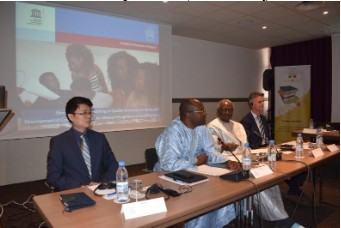 Establishment of the Network of National Quality Assurance Agencies for French-speaking Africa (RAFANAQ)In February 2020, the Workshop for the Implementation of Component 3 of the UNESCO-Shenzhen Project was held in Dakar, Senegal: Strengthening Quality Assurance and mutual recognition of qualifications in Higher Education in Africa. During the workshop, the Network of National Quality Assurance Agencies for French-speaking Africa (RAFANAQ) was established by national quality assurance agencies in Africa.
Establishment of the Network of National Quality Assurance Agencies for French-speaking Africa (RAFANAQ)In February 2020, the Workshop for the Implementation of Component 3 of the UNESCO-Shenzhen Project was held in Dakar, Senegal: Strengthening Quality Assurance and mutual recognition of qualifications in Higher Education in Africa. During the workshop, the Network of National Quality Assurance Agencies for French-speaking Africa (RAFANAQ) was established by national quality assurance agencies in Africa.
-
Dimitri Sanga
Director of UNESCO Dakar Regional Office, OIC UNESCO Abuja Regional Office
The UNESCO-Shenzhen Project aims to reinforce the capacity of the higher education sector in terms of quality assurance, and also to build networks. The challenge of this project is to pool together the evaluation tools among African countries in the sub-region. Since there is mobility of students and workers among the countries, the evaluation methods should not be different. The best case is that we have common tools of evaluation. -
Professor Lamine Guèye
Executive Secretary of ANAQ-SUP
(The UNESCO SFIT Project) is a UNESCO-China project, principally with the city of Shenzhen, which aims to improve the quality of higher education. The importance of the partnership is that most African countries are signatories of the SDGs. Besides SDG4 "Quality Education", all African countries aspire to strong, quality and inclusive growth able to create jobs. In order to achieve economic growth and job creation, we need quality labour force. Therefore, we have to harmonise evaluation tools.(Higher education quality assurance) structure was reinforced within the framework of the UNESCO-Shenzhen project in terms of training, creation of networks and helping other agencies of francophone countries) -
Professor Kuassi Deckon
Focal point of UNESCO-SFIT project in Togo, Professor of University of Lomé
The international financing in support of the Togolese quality assurance system, with ample technical backstopping but no interference, allows the freedom of the Togo national team to define the project activities according to national needs and contexts. The Project has also generated ripple effect and facilitated the exchange between Togo and other African countries in terms of quality assurance in higher education.



